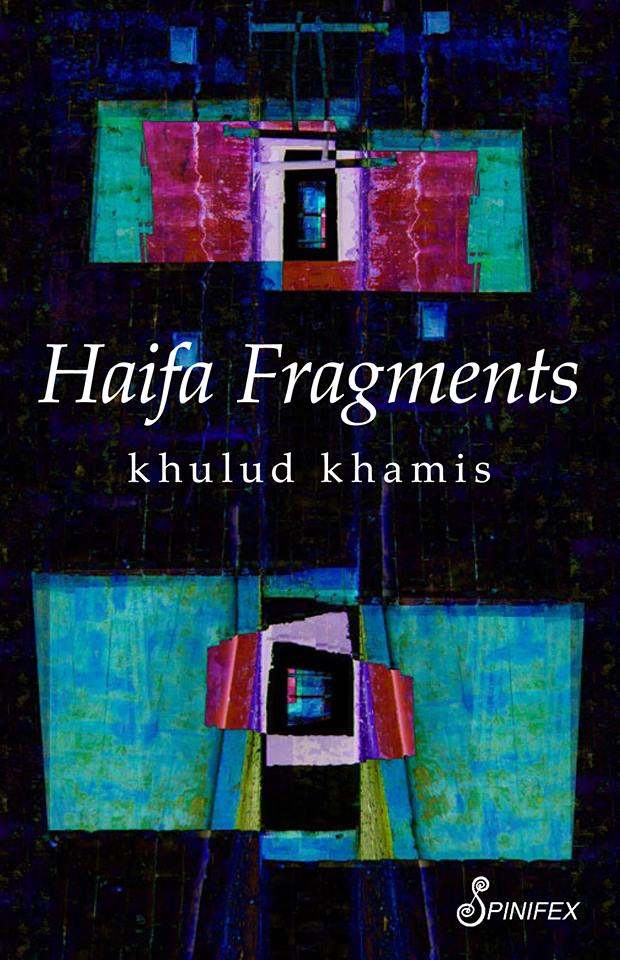Haifa Fragments, Spinifex Press and New Internationalist. (2015).
Fila 37 – Frammenti di Haifa (Italian translation)
Guldunya Yayınları – Hayfa’nın Kırık Parçaları (Turkish translation)
Reviews of Haifa Fragments
No Easy Answers but a Focus on the Shared Humanity of Religion is Compelling: “Despite their fragmented lives, Khamis’s Palestinian characters find themselves ‘united by tradition, history, language, heritage; divided by occupation.'” Lucy Popescu, The Independent.
Fragments of Palestine Woven together in Literary Plea for Female Solidarity: “With her debut novel Haifa Fragments, Palestinian Slovakian writer khulud khamis pens a compulsive narrative that examines the complex of nationality, gender, sexuality, religion and culture in Palestine.” Peter Cherry, The Electronic Intifada
“Khulud Khamis, a resident of Haifa herself, has written the book with authority, keeping the right balance of passion and thought. She has successfully managed to visit the most hard-hitting issue for Palestinians who live inside pre-1948 Palestine, namely, identity. Using the form of a novel, she does so with dignity and delicacy, maintaining a sense of humanity throughout, and avoiding unnecessary and complicated academic jargon. Her fresh style is decorated with poetry, and easy-to-follow remnants are written in short chapters and ordered chronologically, forming an alluring storyline. Each chapter starts with a different Arabic letter, giving the reader a nice introduction to the sounds and shapes of Arabic letters. Furthermore, the text is rich with common colloquial Arabic expressions, and the book includes an expanded glossary for reference. Haifa Fragments is a book of hope, delusion, and pain; it is a most welcome addition to Palestinian literature, especially as it sheds light on subjects often considered taboo. It must be read by anyone who wants to understand the social and cultural mechanism of a fragmented society that lives under several layers of oppression, both old and new. Mahmoud Muna, This Week in Palestine.
“It is not easy to avoid dates, political events and national catastrophes in Palestinian literature, but Khamis is determined not to catalogue or explain out. The work is contemporary and those who are familiar with the political background would be able to place events that are alluded to, but this vibrant novel is completely open to those with little or no knowledge of Palestinian history. It does not seek to instruct the reader, but allows them to understand how a reality can feel, how it impacts behavior, relationships and allegiances. Everything is political and yet many of the key aspects of Maisoon’s life (family, lovers, work) aren’t overtly so. There is a luxury, Khamis concedes, in having the status that she has, as a second-class citizen of a state, rather than as a subject of occupation. She can struggle to live as fully as she desires, but she does not have to struggle to survive and she appreciates the space allowed to her not to have to do so.” Selma Dabbagh, Mascara Literary Review.
“Haifa Fragments is a novel written by Khulud Khamis, a Haifa native, and so has an authentic Haifa ‘feel’. The book evokes the social uniqueness and geography of the city that is situated on the slopes of Mount Carmel, and interestingly, the Arab quarter which is the less affluent area near the bottom of the mountain near the coast and the port.” Anna Couani, Rochford Street Review
“A self-defined feminist, Khamis displays the best of feminist writing. Gender matters, but so do other issues. Both her female and male characters are well-developed and compelling, their lives affected by both the personal and the political. Women love each other as well as loving men. […] Khamis writes so well that we feel the constant dangers of her character’s lives. I held my breathe whenever they crossed into the Occupied Territory. The book is less about the original Israeli take-over and more about how that history continues to shape lives today. Khamis is able to tell a narrative combining continuing anger over the past and present treatment of Arabs by Israelis with a story of Jew and Arab friendship.” Marilyn Brady
“How do ordinary people go about their lives in such a situation? This is exactly the question that Khulud Khamis, the author of this intricately faceted gem of a novel, has chosen to address.” Sara Dowse.
“The novel presents a kaleidoscope of interesting characters that converge and diverge creating a cacophony of diverse narratives that bring home the title of the book. How the author has managed to weave a tale from fragmented bits and pieces of her characters’ lives to create a wholly immersive, workable plot is one of the strongest and laudable points of the book. Her characters are well rounded, engaging and plausible.” Rana Asfour
Video review by Chris Brazier, co-editor of New Internationalist, the UK publisher of Haifa Fragments.
Video interview with Susan Hawthorne, the publisher of Spinifex Press.
Q&A with New Internationalist, the UK publisher of Haifa Fragments
Review of Frammenti di Haifa:
http://nena-news.it/cultura-haifa-un-frammento-di-speranza/
https://editoriaraba.wordpress.com/2016/01/12/frammenti-di-haifa-e-altre-storie/
Frammenti di Haifa – In Israele tra politica, religione, amicizia e sessualità



